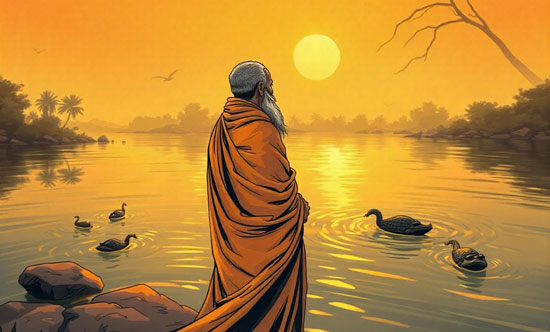Lessons from Narayan's Journey in Biswapur
Experience the profound story of Narayan, a Brahman from Biswapur, who seeks renewal through body transfer, revealing insights on desire, aging, and spiritual wisdom.
Narayan's Journey in Biswapur
The 22nd Tale of Betal Pachisi
The spirit said, "Your majesty! there is a city named Biswapur, the king of which was named Bidagdha. A Brahman, named Narayan, dwelt in his city. He one day began thinking to himself, 'My body has become old, and I am acquainted with the science which enables one to enter another's body; it is therefore better that I quit this old body, and enter the body of some young man and enjoy life.' When he had determined on this in his mind, he set about entering a youthful body; but first he wept, and then he laughed, and after that he entered it and came home. All his kinsfolk, however, were aware of what he had done, and thereupon he said to them, 'I have now become an ascetic.'"

"Having said this, he began to recite (as follows): 'He who dries up the fountain of hope with the fire of austere devotion, and placing his soul therein, (thus) deadens his senses—he may be termed a wise devotee. But the way of the people of this world is (such), that the body may waste away, the head shake, the teeth drop out, and they walk about with a stick in their old age, yet, even then, desire is not quenched. And thus it is that time passes away—day comes, night arrives, a month is over, a year is completed; one is a child, then an old man, while nothing is known as to who one himself is (lit. I am), and who others are, and why one grieves for another. One comes, another goes, and ultimately all life must depart—not one of these will remain. Many and various bodies are there, and many and various minds, and many and various affections, and various kinds of delusions has Brahma created; but the wise escape these, and quenching hope and desire, shaving their heads, taking a staff and water-pot in their hands, subduing the passions of love and anger, become ascetics, and wander barefooted from one place of pilgrimage to another; these same find eternal salvation. This world, moreover, is as a dream; to whom can you impart pleasure in it, to whom pain? It is even like the new leaf shooting from the centre of the plaintain tree, wherein is no pith whatever. And those who pride themselves on riches, youth, or knowledge, are unwise. Again, they who turn devotees, and, taking a water-pot in hand, beg alms from door to door, and nourishing their bodies with milk, clarified butter, and sugar, become lustful, and have sexual intercourse with women, they nullify their religious meditations.' After repeating so much, he proceeded, saying, 'I will now go on a pilgrimage.' On hearing these words, his relations were much pleased."
Having told so much of the story, the spirit said, "Your majesty! why did he weep, and why did he laugh?" Then the king said, "Calling to mind his mother's love in his infancy, and the happiness of his youth, and from a feeling of affection in having remained so many days in that body, he wept; and having succeeded in his art, and entered a new body, he laughed with pleasure." On hearing these words, the spirit went and hung on to the same tree; (and) again did the king bind him as before, place him on his shoulder, and carry him away.
Try out the other sections

 Craft Ideas for Kids
Craft Ideas for Kids Rhymes & Poems
Rhymes & Poems Benefits of Yoga for Kids
Benefits of Yoga for Kids School Projects & Homework Help
School Projects & Homework Help